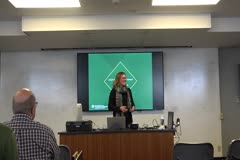Colloquia for Spring 2024
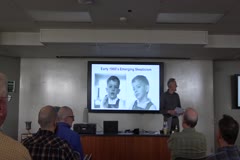
Carbon, Climate, my Career, and the Prospect of Being Replaced by Linear Regression
May 09, 2024
Scott Denning
Hosted by Department
I wanted to be an astronomer when I was a kid, but switched to geology in college. I worked briefly in the oil industry in the 1980s then lost my job when the industry collapsed in 1985. I started at CSU in 1986 working on the chemistry of precipitation and surface waters in Rocky Mountain National Park and carried heavy sampling equipment into Loch Vale 200 Tuesdays in a row! I started taking…
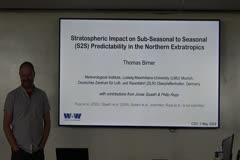
Stratospheric Impact on Sub-Seasonal to Seasonal (s2s) Predictability in the Northern Extratropics
May 02, 2024
Thomas Birner
Hosted by Dave Thompson
Extreme states of the polar stratospheric circulation during winter tend to be followed by anomalies in the near-surface circulation for several weeks, especially over the North Atlantic/Eurasia sector. Previous research has highlighted an associated robust increase in subseasonal to seasonal (S2S) forecast skill related to forecast ensemble mean anomalies. This talk will be centered around…
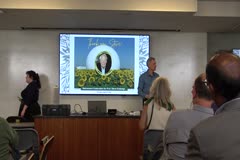
Prof Steve Rutledge Retirement Celebration
April 25, 2024
Steve Rutledge
Hosted by Department
In this short talk, I will first provide some remarks about my graduate school days. Then I will talk about several "big breaks" had at the start of my career that jump started my research on convection in the mid-latitudes and the tropics. I will then overview the two major facilities I led during my time at CSU, the CSU - CHILL National Radar Facility and the SEA - POL radar. In…
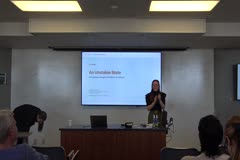
An Unstable State: My Continuous Struggle to Find Work-Life “Balance”
April 11, 2024
Libby Barnes
Hosted by ATS Grad Reps
I am a climate scientist. I am also a professor, mentor, mother, partner, sister, daughter, friend, and general member of society. Performing well in any one of these roles is hard work for me, but performing perfectly in all of them is impossible. Here, I will discuss my continuing struggle to find balance between these aspects of my life, and how I am coming to terms with the fact that true…
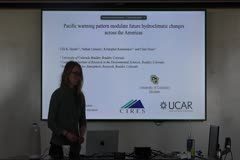
Tropical Pacific Warming Patterns Influence Future Hydroclimate Extremes in the Americas
April 04, 2024
Ulla Heede
Hosted by Maria Rugenstein
The tropical Pacific has an uncertain future. The issue of how the tropical Pacific will respond to global warming is vigorously debated, yet, unfortunately, we still have no clear answer whether the eastern Pacific will experience enhanced warming in the 21st century as global climate models predict, or whether current multi-decadal trends of relative cooling will continue, or perhaps…
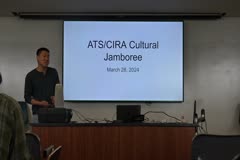
Cultural Jamboree
March 28, 2024
Various
Hosted by Department
Sarah Tisdale “Experiences Living in Japan” Nari Im “Korean Wave 101” Delián Colón-Burgos and Angelie Nieves Jiménez “I'm a Puerto Rican: History, Misconceptions, and Cultural Facts”
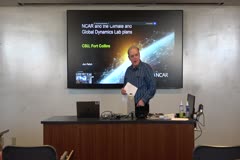
NCAR and the Climate and Global Dynamics Lab Plans
March 21, 2024
Jon Petch
Hosted by Dave Randall
Having been at NCAR for only 6 months now, this seminar will focus on what I've learned about the current priorities for modelling at NCAR and specifically the Climate and Global Dynamics lab. NCAR leadership is currently developing its new strategy. I will reflect on the strengths of the current one, and consider the biggest changes that are taking place externally, and how these may shape…
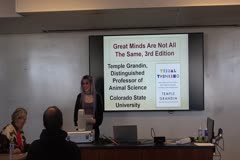
Great Minds Are Not All The Same, 3rd Edition
March 18, 2024
Temple Grandin
Hosted by Department
Temple Grandin is a world-renowned animal scientist and outspoken advocate for autism spectrum disorder (ASD). She has published dozens of books and guides (Temple Grandin publications) on her personal and professional experiences with “being on the spectrum” and how that has served her in her chosen career path. She is often credited with helping shine a spotlight on ASD, and…
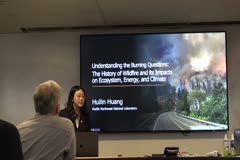
Understanding the Burning Questions: The History of Wildfire and its Impacts on Ecosystem, Energy, and Climate
March 07, 2024
Huilin Huang
Hosted by Jeff Pierce
Wildfire is an integral component of the Earth’s ecosystems. Millions of hectares burn annually, causing profound impacts on vegetation composition, carbon storage, hydrological processes, and socio-economic services. However, fire-adapted ecosystems may encounter new challenges due to climate-driven alterations to fire regimes, with increasing fire size, frequency, and severity observed in…
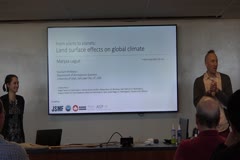
From plants to planets: land surface effects on global climate
February 29, 2024
Marysa Lague
Hosted by Jeff Pierce
Climate modulates what plants grow where, but the reverse of this is also true: plants alter climate by controlling fluxes of water and energy between the land surface and the atmosphere. Changes in land surface properties – such as changes in albedo, evaporative resistance, and aerodynamic properties associated with vegetation change – directly drive changes in local terrestrial climate.…
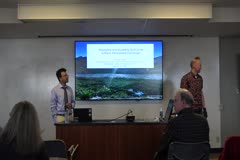
Measuring and Modeling Multi-Scale Surface Atmosphere Exchanges
February 22, 2024
Sreenath Paleri
Hosted by Jeff Pierce
The Earth's surface is heterogeneous at multiple scales owing to spatial variability in various properties. The atmospheric responses to these heterogeneities through fluxes of energy, water, carbon, and other scalars are scale-dependent and nonlinear. Observational studies and large eddy simulations have observed secondary circulations in the turbulent atmospheric boundary layer as coherent…
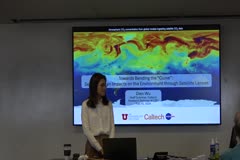
Seeing Human Impacts on the Environment Through Satellite Lenses
February 15, 2024
Dien Wu
Hosted by Jeff Pierce
The growth in the global population and economy has increased the demand for resources, leading to environmental degradation across scales. Our generation faces two key challenges regarding the carbon and water cycles: 1) mitigating anthropogenic emissions while enhancing carbon sequestration and 2) ensuring food security while coping with water scarcity. Effectively addressing these challenges…
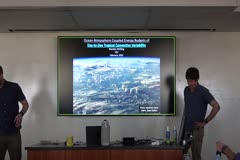
Atmosphere-Ocean Coupled Energy Budgets of Day-to-Day Tropical Convective Variability
February 08, 2024
Brandon Wolding
Hosted by Pat Keys
An energy budget combining atmospheric moist static energy (MSE) and upper ocean heat content (OHC) is used to examine the processes impacting day-to-day convective variability in the tropical Indian and western Pacific oceans. Feedbacks arising from atmospheric and oceanic transport processes, surface fluxes, and radiation drive the cyclical amplification and decay of convection around…
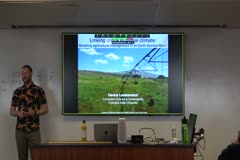
Linking Crops to Global Climate: Agricultural Management in an Earth System Model
January 25, 2024
Danica Lombardozzi
Hosted by Pat Keys
Land management practices are widely used to maintain and increase agricultural productivity. While management decisions are often motivated by site-specific efforts to optimize productivity, they also have the potential to alter biogeophysical and biogeochemical properties of the land surface that can alter local to global climate. In this talk, we explore how agricultural management has…
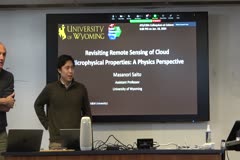
Revisiting Remote Sensing of Cloud Microphysical Properties: A Physics Perspective
January 18, 2024
Masanori Saito
Hosted by Chris Kummerow
The global climate is in part regulated by complex radiative interactions with clouds on various spatial scales in the atmosphere. Satellite remote sensing observations can provide global distributions of cloud properties, while airborne remote sensing observations can characterize local-scale cloud properties. The common essence in both remote sensing observation types is how to interpret…

